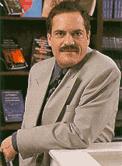Michael Fumento
Factual · Powerful · Original · Iconoclastic
Man on a Mission
January 01, 1999 · Michael Fumento · The Champaign-Urbana News-Gazette · Fumento
Mike Fumento discovered a long time ago that if he could just find a hospitable locale, he could do a lot of thinkin’, that he might even be another Lincoln.
So the Champaign native and University of Illinois law graduate went shopping for a think tank. First, there was the Competitive Enterprise Institute in Washington, D.C., where he stayed for a while. Then he moved to the American Enterprise Institute, but he didn’t like it much. Now he’s at the Hudson Institute, and everything is just fine.
"What a think tank ought to do is take a good scholar whose books don’t necessarily make the best-seller list and pay the guy a decent salary so he can write a thing or two," said Fumento.
Well, he’s getting a decent salary and he’s getting lots of time to write, mostly in his favored fields of science and economics. Indeed, Fumento is a prolific writer, a circumstance he attributes not only to hard work but also to intense interest in the subjects he chooses.
The 39-year-old Fumento is a regular contributor to major newspapers and magazines and he’s just wrapping up work on his fifth book, Reading Between the Lines: How to Understand Health Reporting.
"This is a completed book, 95,000 words," he said.
He said he never got into journalism to get rich. But, all things considered, things are going quite nicely.
"To tell the truth, I am doing pretty well. Actually, I’m buying a house," Fumento said, noting that real estate in the Washington, D.C., area is outrageously priced.
But it’s been a long haul from his graduation from Centennial High School in 1978. The son of a University of Illinois English professor, Fumento served four years in the Army, all the while taking college classes. He left the Army with sergeant stripes and a bachelors degree, immediately enrolling in the UI College of Law.

After graduating in 1985, Fumento worked briefly in government and then decided to pursue a career as a journalist and author. He published his flrst book, The Myth of Heterosexual AIDS in 1990. It espoused the then-controversial premise that claims that AIDS would spread widely into the heterosexual population were vastly overblown.
Nine years later, Fumento said he rarely writes about AIDS because it’s not a big issue on the health scene anymore.
"The bottom’s fallen out of it. Deaths, infections and cases are all way, way down. All infectious disease epidemics hit a plateau and go way down," he said. "The only exciting stuff in AIDS now is the medicine."
Fumento’s venture into AIDS reporting paved the way for his decision to tackle other science issues that he felt had been misreported or exaggerated by the major national media, which he describes as primarily the television networks, a handful of major major newspapers and newsmagazines such as Time, Newsweek and U.S. News & World Report.
His latest work advises news consumers how they can avoid being misled by news reporting on health issues. He describes most health reporting as "dismal" and said it’s the result of reporters not understanding complicated science stories, not pursuing the stories in depth and being almost willingly misled by activists intent on scaring the public.
He notes the public receives a regular diet of questionable stories alleging that various chemicals pose health risks or that new inventions, like cellular phones, cause cancer. He attributes the public’s willingness to believe these scare stories to suspicion about change and suggests that feeling is almost instinctive.
"It’s probably been there since the cave man time. The first man who rubbed two sticks together and created fire was probably looked at with a combination of fear and awe," he said.
Nonetheless, he said the public is intensely interested in the subject of health, or at least ought to be.
"The No. 1 issue people say they care about it is health and the older the population gets the more we’re going to be interested in health," he said. "So this book should sell."
In the course of his work, Fumento has not only revealed myths in health-related stories, but actually come across other serious health issues that are ignored.
His fourth book, The Fat of the Land, concerned the prevalence and danger of obesity in American society. He said it’s a condition that causes thousands of deaths each year and is routinely ignored.
"We are dying in droves from obesity and, contrary to what you may have heard, there is something you can do about it," Fumento said.
Fat of the Land sold 12,000 copies in hardcover and is currently out in paperback. Fumento said he was disappointed in the sales, but that the subject received considerable attention in the media.
"That book led to excerpts or original articles in several of the largest circulation magazines," he said. "I think, I hope, I pray that I really helped get the message out."
Whatever the subject, spreading the word is Fumento’s top priority. That’s why he recently completed a Fumento Web page (www.fumento.com) that explains who he is, what he does and makes available much of the journalistic work that he’s done.
"It was a lot of work.... But it goes along with my idea that you’ve got to educate people," he said.
